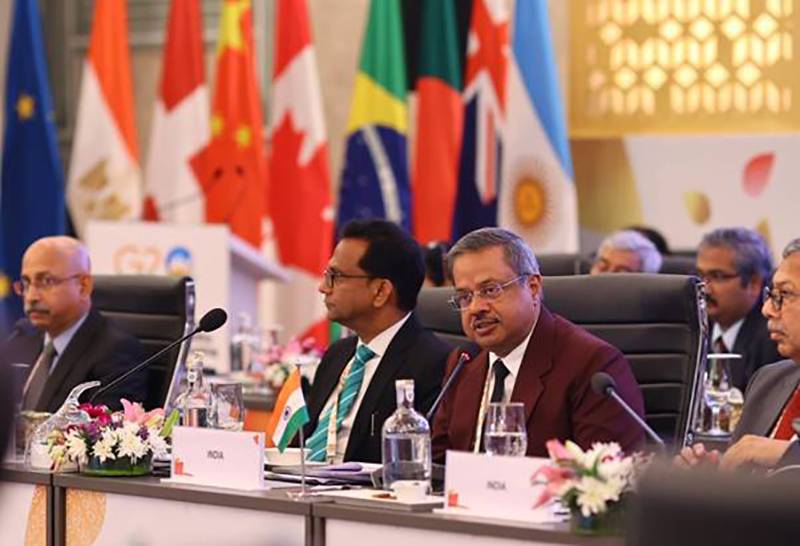
The G20 countries' first meeting of the Environment and Climate Sustainability Working Group (ECSWG), presided over by India, signals the start of fruitful discussions about a sustainable future. The Ministry of Environment, Forests and Climate Change (MoEFCC), Government of India, served as the meeting's host during its three days from February 9 to 11, 2023.
The meeting started with a side event that discussed best practices for restoring ecosystems in areas affected by mining and forest fires. This was followed by a tour of the Bannerghatta National Park and the Kalkere Arboretum to highlight Karnataka's forest ecosystems, ecosystem restoration, and ecotourism models, as well as wildlife protection.
Union Minister for Housing and Urban Affairs as well as Petroleum and Natural Gas, Hardeep Puri, gave the opening remarks on the second day. After that, Leena Nandan, secretary of the MoEFCC, gave the welcome speech. She emphasised that India intends to address environmental and climate change issues using a consensus-driven and action-oriented approach.
The ECSWG will work closely with other G20 key working groups to address environmental, sustainability, and climate change issues holistically, she added. The first half of the second day's discussions focused on ways to improve the Global Biodiversity Framework and repair anthropogenically impacted land-based ecosystems.
The development of circular economies in a variety of industries, such as steel and biowaste, as well as the role of extended producer responsibility in the development of a circular economy, were discussed in the second half.
A G20 industry coalition for circular economy and resource efficiency was also proposed. Delegates from all nations participated enthusiastically in the sessions. The Green Development Pact and the proposed High-Level Principles on LiFE were discussed during this session. Both of these potential deliverables were being guided by the Development Working Group. The delegates who had travelled from 29 different countries were given a special taste of India during a cultural event that was held in the evening to highlight the rich cultural heritage of Karnataka.
The session on the topic of "Sustainable and Climate Resilient Blue Economy" kicked off the third and final day. Dr. M. Ravichandran, Secretary of the Ministry of Earth Sciences, gave the opening remarks. Over the course of three meetings and one side event, the Oceans and Blue Economy discussions covered a variety of topics, including marine litter, the preservation and improvement of coastal and marine ecosystems, and marine spatial planning. Discussions centred on the issue of marine plastic pollution and its negative effects.
The technical study on "Accelerating the transition to Sustainable & Climate Resilient Blue Economy" that would cover all G20 Countries and provide inputs for development of high-level principles on "Sustainable and Climate Resilient Blue Economy" was introduced by the Presidency. It was also mentioned that the Indian Presidency, working with Japan, will publish the fifth report on efforts to combat marine plastic litter under the G20 Framework for Marine Plastic Litter.
Delegates endorsed measures for the conservation and improvement of biodiversity, for the sustainable use of ocean resources, and for the reduction of pollution and littering. These are essential for increasing resilience to climate change effects and maintaining oceans' capacity to store carbon, in addition to fostering a thriving blue economy that would support the livelihoods of nearby coastal communities.
The India Presidency intends to convene an Ocean 20 dialogue to facilitate in-depth discussion on crucial Blue Economy issues, it was noted towards the end of the session. Alongside the Ocean 20 dialogue, the Indian Presidency also announced a coordinated beach cleaning event to be held on May 21, 2023, in order to highlight the significance of taking action against marine litter and enlisting community support. The significance of the LiFE (Lifestyles for Environment) Principles was emphasised because altering behaviour to promote the use of sustainable alternatives to single-use plastics and the prevention of littering, among other things, would help maintain clean and healthy oceans.
The media was briefed on the day's discussions by the secretaries of the MoEF&CC and the Ministry of Earth Sciences. The delegates agreed to engage constructively and work with the India Presidency for additional work towards achieving the proposed outcomes envisioned under the ECSWG, and the discussions will continue in the second half. The discussions from this meeting will be continued at the second ECSWG meeting, which will be held in Gandhinagar from March 27 to 29.
















